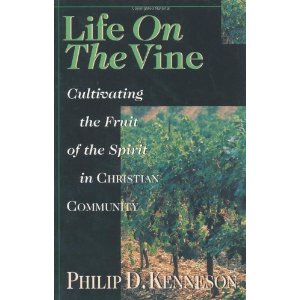 Philip D. Kenneson’s Life on the Vine: Cultivating the Fruit of the Spirit stands as a powerful message to the Church, especially the North American church. In addition to preaching the word, Kenneson emphasizes the importance of the church living out the word by bearing the fruit of the Spirit. After all, there needs to be a greater harvest of the Spirit’s fruit in order to continue to advance God’s mission in the world, not because it will make God love us more or because our salvation is at stake (Chapter 1, Location 130). Every fruit of the Spirit finds its origins in the character of God. As a result, Christians become more human and are shaped more into the image of God as the fruit of the Spirit is developed in their lives. As much as cultivating the fruit of the Spirit is something that needs to be done individually in every Christian’s life, the single most important venue for this to take place in is one’s local church where one can practice living out the fruit of the Spirit in relation to God and others.
Philip D. Kenneson’s Life on the Vine: Cultivating the Fruit of the Spirit stands as a powerful message to the Church, especially the North American church. In addition to preaching the word, Kenneson emphasizes the importance of the church living out the word by bearing the fruit of the Spirit. After all, there needs to be a greater harvest of the Spirit’s fruit in order to continue to advance God’s mission in the world, not because it will make God love us more or because our salvation is at stake (Chapter 1, Location 130). Every fruit of the Spirit finds its origins in the character of God. As a result, Christians become more human and are shaped more into the image of God as the fruit of the Spirit is developed in their lives. As much as cultivating the fruit of the Spirit is something that needs to be done individually in every Christian’s life, the single most important venue for this to take place in is one’s local church where one can practice living out the fruit of the Spirit in relation to God and others.
As the culture in North America becomes increasingly post-Christian and post-modern, Christians should not expect to continue to develop their faith in a privatized and individualistic manner. If the church is to truly be the salt and light of the world, namely, a city on a hill that cannot be hidden, then the church needs to begin corporately living out and embodying the fruit of the Spirit (Matt 5:13-16). How else will Christian’s “light shine before men, [so] that they may see your good deeds and praise your Father in heaven” (Matt 5:16)? For the Christian witness to be powerful, the Gospel needs to be preached through word and deed (the deed being the evidence of the fruit of the Spirit).
Life on the Vine is the best book that I have read which has explained the fruit of the Spirit. It is such a practical guide that I am going to make it a regular part of my ministry and approach to discipleship
I give this book five stars out of five.